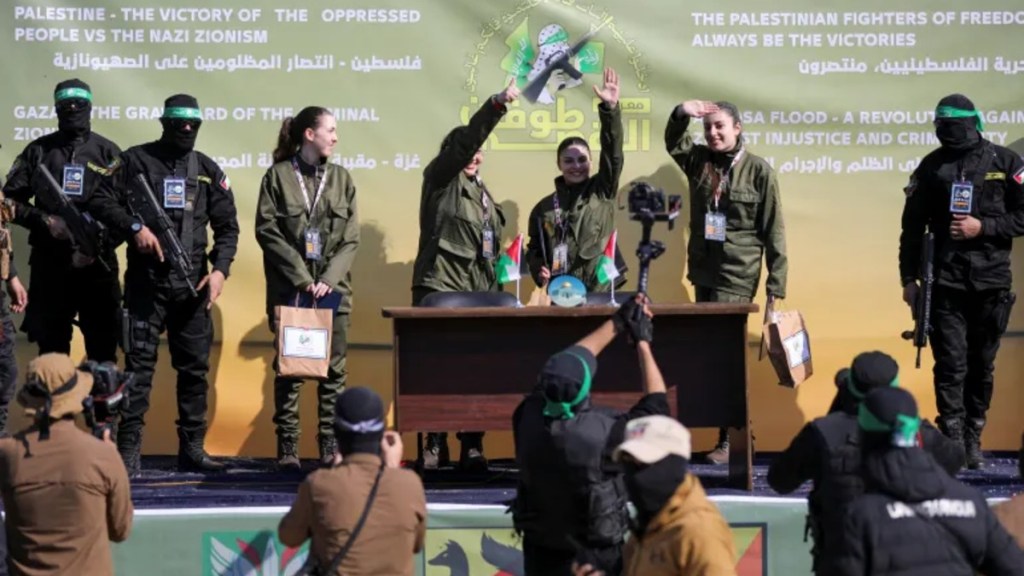Hamas militants handed over four female Israeli soldiers to the Red Cross in Gaza City on Saturday as part of a fragile ceasefire agreement. The release followed the exchange of 200 Palestinian prisoners, marking the latest development in the ongoing truce between Israel and Hamas.
The four soldiers—Karina Ariev, Daniella Gilboa, Naama Levy, and Liri Albag—were seen waving and smiling as they were paraded on stage in Gaza City’s Palestine Square. Surrounded by militants and a crowd of thousands, the soldiers were later escorted to waiting Red Cross vehicles for their transfer to Israeli forces.
The release was part of a larger deal involving the liberation of 200 Palestinian prisoners, including 121 individuals serving life sentences. Some of the prisoners, like Mohammad Odeh and Wael Qassim, were responsible for deadly attacks against Israelis, including a bombing at Hebrew University in 2002 that killed nine people.
In return for the four Israeli soldiers, Israel freed 70 Palestinian prisoners, who were transported to Egypt as part of the ongoing ceasefire agreement. The truce, brokered by Egypt and Qatar, has so far managed to halt the deadly conflict that has raged since Hamas’ attack on Israel on October 7, 2023.
“I’m speechless,” said Aviv Bercovich, one of the onlookers. “I had goosebumps watching them. I just want the war to end.” Prime Minister Benjamin Netanyahu’s office later released a video showing the freed hostages being welcomed at an Israeli army base. One of them, Liri Albag, smiled, gave two thumbs up and made a heart shape with her hand before getting into a van.
However, the release of a civilian hostage, Arbel Yehoud, was delayed, leading to tensions between the two sides. Israeli officials expressed concern, with Prime Minister Benjamin Netanyahu’s office stating that Palestinians would not be allowed to return to northern Gaza until Yehoud’s release is confirmed. Hamas officials stated that the delay was a technical issue and that Yehoud would be freed next week.
The ceasefire agreement, which began on January 19, has allowed for the first time in months a reprieve from airstrikes and fighting. Both Israel and Hamas continue to negotiate the terms for the next phases of the truce, which could include further hostages’ release and the withdrawal of Israeli forces from Gaza. Despite the cautious optimism, many families remain anxious about the fate of their loved ones still held in captivity.
In Tel Aviv, the release was met with emotional reactions. Hundreds gathered at Hostages Square to watch the release, with some celebrating the return of the hostages, while others, like Yoni Collins, a family friend of one of the remaining captives, expressed concern for those still held.
The situation remains uncertain as the conflict has devastated Gaza, displaced its population, and left the region in ruins. As negotiations continue, hopes for lasting peace are mixed with the harsh realities of the human cost of the war.
(With AP Inputs)


